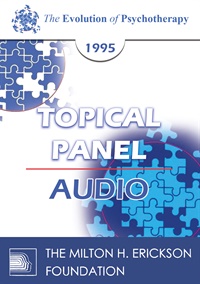EP95 Panel 10 - Philosophical Issues and Psychotherapy - Eugene Gendlin, PhD; Thomas Szasz, MD; Paul Watzlawick, PhD; Irvin Yalom, MD
- Average Rating:
- Not yet rated
- Topic Areas:
- Topical Panels | Psychotherapy | History of Psychotherapy | Meditation, Spirituality and Yoga
- Categories:
- Evolution of Psychotherapy | Evolution of Psychotherapy 1995 | Pioneers in Couples and Family Therapy
- Faculty:
- Eugene Gendlin, PhD | Thomas Szasz, MD | Paul Watzlawick, PhD | Irvin Yalom, PhD
- Duration:
- 1 Hour
- Format:
- Audio Only
- Original Program Date:
- Dec 15, 1995
- License:
- Never Expires.
Description
Description: This panel explores the philosophical foundations of psychotherapy, from existentialism to Eastern traditions. Speakers reflect on how philosophy informs clinical thinking, with discussions on freeing clients from cultural constraints, resisting the over-medicalization of therapy, and using constructivist and existential lenses to deepen practice. Topics include Nietzsche’s influence, the ethics of managed care, and the relevance of quantum and Eastern philosophies in understanding the self.
Moderated by Carol Kershaw, EdD.
Educational Objectives:
- To compare and contrast clinical and philosophical perspectives of experts.
*Sessions may be edited for content and to preserve confidentiality*
Credits
Handouts
| Timestamped Transcript (807 KB) | 18 Pages | Available after Purchase |
| Ericksonian Learning Snapshot (248.2 KB) | 2 Pages | Available after Purchase |
Faculty
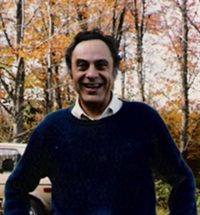
Eugene Gendlin, PhD Related Seminars and Products
Eugene T. Gendlin, PhD, is an American philosopher and psychotherapist who developed ways of thinking about and working with living process, the bodily felt sense and the 'philosophy of the implicit'. Gendlin received his Ph.D. in philosophy in 1958 from the University of Chicago where he became an Associate Professor in the departments of Philosophy and Psychology.
His philosophical work is concerned especially with the relationship between logic and experiential explication. Implicit intricacy cannot be represented, but functions in certain ways in relation to philosophical discourse. The applications of this "Philosophy of the Implicit" have been important in many fields.
His philosophical books and articles are listed and some of them are available from this web site. They include Experiencing and the Creation of Meaning, (in paperback) and Language Beyond Post-Modernism: Saying and Thinking In Gendlin's Philosophy (edited by David Levin) , both from Northwestern University Press, l997 and A Process Model.
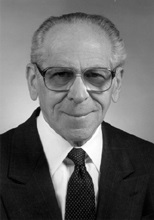
Thomas Szasz, MD Related Seminars and Products
Thomas S. Szasz, (M.D., University of Cincinnati, 1944) was Professor of Psychiatry at the State University of New York, Upstate Medical Center in Syracuse. He was recipient of numerous awards, including the Humanist fo the Year Award from the American Humanist Association and the Distinguished Service Award from teh American Institute for Public Service. He has received a number of honorary doctorates and lectureships, and served on the editorial board or as consulting editor for ten journals.
Szasz has authored approximately 400 articles, book chapters, reviews, letters to the editor and columns. He has written 19 books.
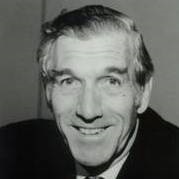
Paul Watzlawick, PhD Related Seminars and Products
Paul Watzlawick, received his Ph.D. from the University of Venice in 1949. He has an Analyst's Diploma from the C.G. Jung Institute for Analytic Psychology in Zurich. Watzlawick has practiced psychotherapy for more than 30 years. He was research associate and principal investigator at the Mental Research Institute. He was Clinical Professor at the Department of Psychiatry and Behavioral Sciences, Stanford University Medical Center. Watzlawick is a noted family therapist; he is recipient of the Distinguished Achievement Award from the American Family Therapy Association. Also, he is author, co-author or editor of eight books on the topics of interactional psychotherapy, human communication and constructivist philosophy.
He formulated five axioms. They are:
- It is not possible to not communicate. Every behavior is some kind of non-verbal communication.
- Every communication has a content. In addition, there is 'metainformation', which says how the communicator wants to be understood.
- All partners involved in a communication process also interpret their own behaviour during communication.
- Human communication involves both verbal and non-verbal communication. In addition to the spoken words, there are is also a non-spoken part (gestures, behavior, intonation..) which is part of the communication.
- Communication between humans is either symmetric or complementary. This is based on whether the relationship of those communicating is based on differences or parity.
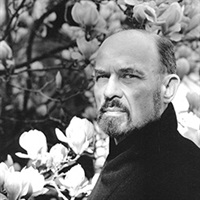
Irvin Yalom, PhD Related Seminars and Products
Dr. Yalom is a Professor Emeritus of Psychiatry at the Stanford University School of Medicine. His major areas of interest are Group Psychotherapy and an existentially - inter-personally based individual therapy. In recent years, he has taught via narrative using short stories and novels to teach the art of psychotherapy.
Dr. Yalom was the recipient of the first ever Lifetime Achievement Award presented by The American Group Psychotherapy Association (AGPA) at the 75th meeting on March 6, 2017 in New York City.


